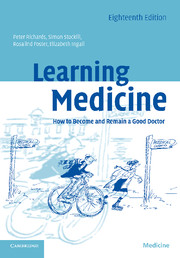Book contents
- Frontmatter
- Contents
- Foreword
- Preface
- 1 Why medicine and why not?
- 2 Opportunity and reality
- 3 Requirements for entry
- 4 Choosing a medical school
- 5 Application and selection
- 6 Interviews
- 7 Medical school: the early years
- 8 Medical school: the later years
- 9 Doubts
- 10 The new doctor
- 11 Developing your career
- 12 Career opportunities
- 13 Privileges and responsibilities: avoiding the pitfalls
- Postscript
- Appendices
- Index
3 - Requirements for entry
Published online by Cambridge University Press: 02 December 2009
- Frontmatter
- Contents
- Foreword
- Preface
- 1 Why medicine and why not?
- 2 Opportunity and reality
- 3 Requirements for entry
- 4 Choosing a medical school
- 5 Application and selection
- 6 Interviews
- 7 Medical school: the early years
- 8 Medical school: the later years
- 9 Doubts
- 10 The new doctor
- 11 Developing your career
- 12 Career opportunities
- 13 Privileges and responsibilities: avoiding the pitfalls
- Postscript
- Appendices
- Index
Summary
Entry to medical school is academically the most competitive moment in the student's life. However, becoming a doctor requires many more qualities than brain power, including compassion, endurance, determination, communication skills, enthusiasm, intellectual curiosity, balance, adaptability, integrity, and a sense of humour. All these are highly desirable attributes but not absolute “requirements” for entry to medicine: few have them all but a remarkable number of applicants have many.
Academic ability is an essential requirement for entry, and the ability to pass examinations remains important throughout the course and the subsequent years of postgraduate training. Less competitive than A levels, but no less intense, were the traditional end of first and second year examinations on the sciences underpinning medicine. New curricula that emphasise understanding and integration of knowledge rather than “facts” are tested more by continuous assessment, a less destructive process than a series of annual crises but not without a constantly recurring academic tension. Professionally, the hardest examinations are those for the higher specialist diplomas of fellowship or membership of the Medical Royal Colleges, requiring a broad and solid grasp of the clinical skills, knowledge, and, to an increasing extent, the attitudes appropriate to a specialist. “Finals” – the examinations for the Bachelor of Medicine and Surgery degree, the degree which acts as the basis for a provisional licence to practise as a doctor, are largely a matter of hard slog, particularly in the later years. They used to be taken as a big bang at the end of the course but are now broken up at most universities over a period of about 18 months.
- Type
- Chapter
- Information
- Learning MedicineHow to Become and Remain a Good Doctor, pp. 27 - 48Publisher: Cambridge University PressPrint publication year: 2007

